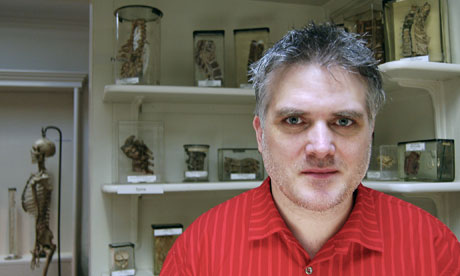
This is Dan Rhodes's fifth novel and shares the same elliptical intelligence that was first evident with the brilliant Timoleon Vieta Come Home (2003), which established his reputation as a writer of original and offbeat fiction. Like much of Rhodes's work, This Is Life is a charming and warm-hearted book, full of dark paradoxes and witty ideas and sexual jokes and people you would like to spend time with.
At one pole is the story of Aurélie Renard, a young art student, who is given the unexpected weeklong custody of an eight-month-old baby following an unfortunate pebble-throwing incident relating to the instigation of her art project. At the other is the novel's finest creation: Le Machine, a performance artist who shaves himself to a state of preternatural nakedness and then lives on stages around the world while collecting his every excreta in the finest glassware the host nation can provide. Le Machine's work is called Life and it has just returned to Paris, where the novel is set.
Meanwhile, between Aurélie and Le Machine, a merry-go-round of secondary characters revolves to further delight the reader. There is Aurélie's friend Sylvie, so hot that ex-boyfriends kill themselves in despair and then insist that she attend their funerals dressed in something "too short" and "too tight" in order to sing to their coffins. There's the brilliant critic, Jean-Didier Delacroix, of whom, even in his crib, his parents would inquire: "How is our future little arts correspondent today?" There's Monsieur Rousset, who (tenderly) runs the last erotic cinema of real quality in Paris, at which he shows such aficionado choices as the "1973 Inuit classic Cut Not a Circle in the Ice Tonight".
Rhodes is interestingly concerned with art and the "magic" of art. "It comes back to that word again," explains Le Machine. "Magic. If you are an artist, you must believe you have it." And one of the most appealing aspects of the novel is that its magical-realist tendencies allow for and promote dozens of funny moments – some straightforward, others elliptical.
Rousset's daughter, for example, is a lesbian, but she can't tell her father, "not because she was worried about his reaction… nor because she was in any way insecure, but because she knew how much he enjoyed girl-on-girl porn" – and didn't want to ruin it for him. When, gently, she does finally come out, Rousset stares into space and says: "I do love my lesbian porn. You know your old dad too well."
Less well-achieved is the setting. Indeed, given that the novel makes so much of its Amélie-esque Paris (the film haunts the book), there is little of the city that is vivid or memorably brought to life. Rhodes tells us about "the steep and narrow west end of the Rue Norvins" and the "neon lights of Pigalle", but I never felt there.
Also, there is throughout the novel a faintly queasy relationship between the author and his variously attractive lead women: on the one hand, an adolescent male sensibility is at play in the prose; on the other, the cod-feminist demeanour of chick-lit. For example, kooky Aurélie and stunning Sylvie "bond" over "all sorts of things"; later on in the novel, when the wine "kicks in", Aurélie feels "sexy" in her "tight black mini-dress", but ends up "curled up on the bed in her short, tight black dress, a sobbing mess of guilt and shame". Rhodes wants these girls to be liked – by women, presumably. (Don't worry, you poor creatures of callow jealousies and narrow, magazine-fed sensibilities: Aurélie has goofy teeth and asymmetrical ears – you can like her!) But all this unctuous soliciting of likability is patronising and surely just diminishes everyone involved – not least Rhodes himself, who elsewhere deals in such fine phrases as a "choral intake of breath" from the collected onlookers outside Aurélie's apartment.
More than this, I found that ultimately the trick of magical realism did not quite work for me. Even with the various misunderstandings and legerdemain Rhodes deploys, This Is Life is wholly implausible: a fairytale populated by characters from a fairytale. Nothing wrong with that – and there are worthwhile and engaging gains to be had from the form. But the skill with this kind of writing is not in the handling of the magic, it is in the handling of the realism. And for such tales to live beyond the spell of their invention – Kafka, Márquez, some Rushdie – they must somehow resonate in the realistic adult world as well. Still, there are many good things about this novel, and I refer you to the start of this review as to why.
Edward Docx's most recent novel is The Devil's Garden (Picador)

